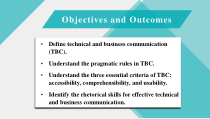 PPT
PPT
【文档说明】技术与商务交流英语第二版课件Chapter1IntroductiontoTechnicalandBusinessCommunication.pptx,共(39)页,5.830 MB,由小喜鸽上传
转载请保留链接:https://www.ichengzhen.cn/view-158875.html
以下为本文档部分文字说明:
ObjectivesandOutcomes•Definetechnicalandbusinesscommunication(TBC).•UnderstandthepragmaticrulesinTBC.•Understan
dthethreeessentialcriteriaofTBC:accessibility,comprehensibility,andusability.•Identifytherhetoricalskillsforeffectivetechnical
andbusinesscommunication.ONTENTSCPurposesEssentialCriteriaImportanceDefinition1.WHATISCOMMUNICATION?2.WHATISTBC?I.DefinitionofTechnica
landBusinessCommunicationCommunicationistheprocessoftransferringinformationandmeaningbetweensendersandreceivers,usingoneormorewritten,oral,vis
ual,orelectronicmedia.——exchangeofinformationAccordingtotheirfunctionsinthesociety,communicationcanbeclassifiedintothreecategories:•Communicationfors
urvival•Communicationforentertainment•Communicationforwork1.WHATISCOMMUNICATION?Technical:•oforrelatingtotechnique;•oforrelatingtoapractica
lsubjectthatisorganizedaccordingtoscientificprinciples.TechnicalandBusinessCommunication(TBC)isinformationexchan
geatwork.(Simpledefinition)Asubjectthatstudieseffectiveinformationexchangeatwork.(Academicdefinition)技术与商务信息交流是研究
在工作中有效地进行信息交流的一门学科。2.WHATISTBC?1.FeaturesofModernCommunication2.NeedsAnalysisII.ImportanceofTechnicalandBusinessCommunication1.FeaturesofModern
CommunicationOurageisknownasanageofinformation.ComputersandInternethavechangedpeople’slife.Youcanhardlyworkwithouttechnology.TypicalFeaturesofMode
rnCommunication:•Wehavetoomuchinformationtodealwith.•Wehavetohandlemultidisciplinaryinformationthatisdifficulttous.Q:Howcan
weovercomethesedifficulties?A:Wecan'tchangethesociety.However,wecanchangeourlanguageusedtoexpresstheinformation.Question:Howcanweimproveourlan
guageforeffectivecommunication?Tips●Providepracticalinformation.Giverecipientsusefulinformation,whetherit’stohelpthemperform
adesiredactionorunderstandanewcompanypolicy.●Givefactsratherthanvagueimpressions.Useconcretelanguage,specificdetail,andinform
ationthatisclear,convincing,accurate,andethical.●Presentinformationinaconcise,efficientmanner.Concisemessagesshowrespectforp
eople’stime,andtheyincreasethechancesofapositiveresponse.●Clarifyexpectationsandresponsibilities.Craftmessagestogenerateaspec
ificresponsefromaspecificaudience.Whenappropriate,clearlystatewhatyouexpectfromaudiencemembersorwhatyoucandoforthem.●Offercompelling,pe
rsuasiveargumentsandrecommendations.Showyourreaderspreciselyhowtheywillbenefitfromrespondingtoyourmessagethewayyouwantthem
to.2.NeedsAnalysisToimproveourlanguageforeffectivecommunication,weshouldfirstanswerthefollowingquestions.•Doyouthinkyouhaveenoughkn
owledgeandskillinEnglishforeffectivecommunication?•WhathaveyoulearnedinEnglish?•WhatdoyoulackinEnglish?•Whatdoyoustillne
edtolearnforeffectivebusinesscommunication?BusinessEthicsExample1:①Youcangohomeafteryoufinishedyouwork.②Afteryoufin
ishedyourwork,youcangohome.•ThereislittledifferenceingeneralEnglish.③Youcanturntheswitchto“ON”afteryouhavepu
ttheimmersionheaterintowater.④Afteryouhaveputtheimmersionheaterintowater,youcanturntheswitchto“ON”.Rule:Followthetimeo
rderinprocessdescription.Example2:①Wewillgosightseeingifitisfinetomorrow.②Ifitisfinetomorrow,wewillgosight
seeing.ThereislittledifferencebetweenthetwosentencesingeneralEnglish.③Youshouldrestartthecomputerifthescreendisplaysanerrormessage.④Ifthescreend
isplaysanerrormessage,youshouldrestartthecomputer.Rule:Putconditionbeforeactionininstructions.Theseex
amplesprovideevidencefortwostatements:•Sentencesofthesamemeaningbutdifferentstructuresmayproducediffere
nteffectsincommunication.•Thereexistspecificrulesinthelanguageusefordifferentpurposesandaudiencesunderdifferents
ituations.•Theserulesarecalledpragmaticrules.Definition:Pragmaticrulesarerulesoflanguageinuse,concerningtheapplicationoflanguage•tospecificaudie
nces,•inspecificcontexts,•forspecificpurposes.语用学规则:在特定背景下,为达到特殊目的而针对特殊对象的语言规则。ResultsoftheNeedsAnalysis:•Youhavelearnedther
ulesofhowtowritesentencescorrectly,includingtherulesofgrammarandvocabulary.•Youhavenotlearnedtherulesofhowtowr
itesentenceseffectivelyforspecificpurposes,tospecificaudiencesandunderspecificcontexts.TeachingObjectiveof
TBC:TheobjectiveofTBCistolearnpragmaticrulesandputthemintopracticesoastoincreasetheefficiencyofcommunicationatwork
.III.PurposesofTechnicalandBusinessCommunication•Inform:enableyouraudiencetounderstandyourinformationeff
ectively.•Persuade:convinceyouraudiencetoacceptyourideaeffectively.IV.ThreeEssentialCriteriaofTechnicalandBusinessCommunication
1.Comprehensibility2.Usability3.AccessibilityReview:ThetypicalfeaturesofmodernTBCare:•Wehavetoomuchinformationtodealwith.•Wehavedifficul
tmultidisciplinaryinformation.•AudiencesininternationalTBCaremainlynon-nativespeakersofEnglish.Tocopewiththesefeatu
resandincreaseefficiency,TBChasestablishedthreecriteriaincommunication:•Comprehensibility•Usability•Accessibilityddyourtitle1.Com
prehensibility(Easytounderstand)Definition:Expressinginformationinawaythattheaudiencecanunderstanditquicklyandaccurate
ly.Clearinformationisinformationthatuserscanunderstandthefirsttime,withoutrepetition.专业信息的易理解性Examples:①C
admiumrodswereintroducedintocavitiesinthereactorbyusbeforeitwasgettingoutofcontrol.②Weintroducedcadmiumrodsintocavitiesinth
ereactorbeforeitwasgettingoutofcontrol.(在反应堆失控之前,我们将镉棒放入了反应堆的空腔中。)Thepassivevoiceupsetsthe“Given+New”stru
ctureofinformationbyputtingtheNewbeforetheGiven.Rule:Avoidusingpassivevoiceifpossible.Examples:①Thecomput
erprogramperformedananalysisandconductedanevaluationofournewsystem.②Thecomputerprogramanalyzedandevaluatedournews
ystem.(避免“弱动词+名词化”结构。)Rule:Avoidusingthe“weak-verb+nominalization”structure.Thepragmaticrulesreflectedinth
eaboveexamplesarecalledtechnicalrhetoric(专业修辞学)inTBC.Technicalrhetoricprovidestheprinciplesandskillsofusingl
anguageeffectivelyintechnicalcommunication.Toincreasethecomprehensibilityofinformation,weshouldlearntechnicalrhetoric.2.Usability(Easytou
se)Definition:Expressing(writingorspeaking)yourideainawaythattheaudiencecanfollowittocompletethetask.Readersoftechnicalinformatio
nfallintothreecategories:•Professionalsofyourdiscipline•Professionalsofrelateddisciplines•GeneralreadersoraveragepeopleTechnicalwritingisawriter-re
sponsiblewriting(Theoppositeisreader-responsiblewriting).Itisthewriters’responsibilitytomaketheirwritingeasyforallreaderstofollo
wandusecorrectly.Tomakeyourwritingusefultothereader,youshouldfirstunderstandyourreader.Putyourselfinyourreaders’positionandmakeaudienceanal
ysis.(1)Audience’seducationTheaudience’slevelofeducationaffectstheirreadinglevel.E.g.①Ourinvestigationhasidentifiedthatadditionalnocturnalempl
oymentwouldkeepadolescentsoffthoroughfares.②Ourstudyhasfoundthatmorenightjobswouldkeepyouthsoffthestreets.Rule:Writeaccordingtothelowestlev
elofeducationofyourpredictedaudiences.(2)Audience’sprofessionalexperience:Thisreferstotheaudience’sleveloftec
hnicalknowledge,whichaffectstheirreadinglevelintheirspecialty.E.g.①Unilateralnephrectomywasperformed.②One-sidedkidneycuttingwasperformed.S
pecializedmedicaltermsinthefirstexamplelimittheaudienceonlytoexpertsinmedicine.Rule:Writeaccordingtothel
owestlevelofprofessionalknowledgeofyourpredictedaudiences.(3)Audience’sculturalbackgroundThereaders’socialandcultu
ralbackgroundinfluencestheirthinkingmodeandoutlook.E.g.Ifyouarekilledinanaccident,howmuchdoyouwanttodonateyourorgans?Theq
uestionisnormaltoAmericanaudiencebutregardedasabadluckbyChineseaudience.Rule:Taketheaudiences’culturalbac
kgroundintoconsiderationinyourwriting.(4)Audience’sfeelingoremotionTheaudience’semotionmayaffecttheirreceptivit
yorresistancetoyourwriting.Makeyourwritingreader-friendly.E.g.①Everynurseshouldtakeagoodcareofherpat
ients.②Everynurseshouldtakeagoodcareofhispatients.③Nursesshouldtakeagoodcareoftheirpatients.Rule:Avoidsexistlanguageinwriting.(5)Audience’smo
tivationMotivationisthereasonorcauseforone’saction.Audiences’motivationinfluencestheirattitudetoyourinformation—feelingof
acceptingorrejectingit.E.g.Rule:Adaptyourwritingtoaudiences’motivation.3.Accessibility(Easytofind)Definition:Enableyouraudienc
etofindwhattheywantquicklyandaccuratelyfromlargeamountofinformation.Itisnotenoughforyouonlytowriteyourdocument.Youshouldals
odesignitsothatyouraudiencecancatchtherightinformationfromitquickly.Examplesofdifferentaccessibilityincomparison:Figure1Awor
d-wallwritingFigure2Astructured-writingorinfo-mapFig.1Aword-wallwriting•Samefonttype;•Samefontsize;•Samelinespace;•Lon
gparagraphs;•Noinformationindicatingmarksorlabels.•Traditionalparagraphwritingisnolongereffectiveformoderntechnicalcommunication.•Fig.2InformationMa
p•Bold-facedheadingsrevealthemainideaofthearticle.•Keyinformationismarkedbyitalics.•Relatedinformationischunkedintoshortparagraphs.•In
dividualtopicsareseparatedbywiderspace.•Bulletlistspresentparallelitems.•Thegraphicaidsthetextwithanexample.•DocumentDesignisrequiredtoincrea
seaccessibility.V.Summary•TBCisthestudyofeffectiveinformationexchangeatwork.•ThepurposesofTBCaretoinform(makeyouraudien
ceunderstandyouridea)andtopersuade(makeyouraudienceacceptyouridea).•ToconductTBCeffectively,youshouldfollowthethreecri
teria:comprehensibility,usability,andaccessibility.•Tomeetthethreecriteria,youmustlearntechnicalrhetoric,audiencea
nalysis,anddocumentdesign.Ingeneralsense,bothtechnicalcommunicationandbusinesscommunicationmeanthesame—comm
unicationatwork.ThisbookincludesallthegeneralprinciplesandskillsinTBCbothfortechnologyandcommerce.Theseprinciplesandskillsaretrans
ferrable.Theycanbeusedinthecommunicationforallkindsofprofessionsanddisciplines.Therefore,theskillscanincreaseyouremploymentopportunities
andyouradaptabilitytothewiderangeofnewjobs.1.Findaninstructionmanualofamobilephone,orthatofyourownpho
ne.CommentonitbasedonthethreecriteriaofTBC.2.WriteasummaryofTBCcoursebasedonyourknowledge.HomeworkThanks
 辽公网安备 21102102000191号
辽公网安备 21102102000191号
 营业执照
营业执照